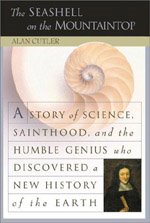
This was a very good book, and it's interesting in several different ways. On the one hand, it's a biography of Nicolaus Steno (which is the modern version of his scientific name, Nicolai Stenoni, which is an adaptation of his real name, Niels Steensen). It's also a history of the foundation of the science of geology, and it's a window into the early days of scientific exploration (before you object and raise the Greeks as an issue, it should be noted that despite their many studies, they never developed the scientific method, or experimental science). Many people unknowingly project our modern attitudes and opinions into the past, taking for granted the ideas of technology and knowledge. Because of that, we often forget that in the past, science and religion were not seen as diametrically opposed. Steno, who basically discovered stratigraphy and whose discoveries implied an age for the Earth older than Ussher's 6,000 years, or any other age based on a literal interpretation of the Bible, was a devout Lutheran who converted to Catholicism and spent the last few years of his life as a Catholic priest on a mission to convert protestants back to Catholicism. The main reason Steno converted was because he could not believe in a literal interpretation of the Bible, but that never altered his views about the existence of God or that God was the driving force behind the world. As a matter of fact, the men of science of Steno's time were studying science in order to find God in the world. That's why many such men were priests, and most men who weren't priests were still devoutly religious, such as Sir Isaac Newton.
Steno was born the son of a goldsmith in Copenhagen, Denmark (which was Lutheran) in 1638. He was born with copious manual dexterity and practiced it when he went to school to become an anatomist. And of course you must note that he started an anatomist, but his most famous discoveries were as a geologist and he ended life as a Catholic priest. This testifies to his many talents and mental prowess. Basically though, it all ties together. He was always a religious man, and he was exploring the beauty of God's creation when he dissected humans or animals. When a shark's head was brought to him for dissection, he noticed the similarity between the shark's teeth and "glossopetrae", or tongue stones that supposedly were natural formations that emanated from the Earth. Philosophers had tried to explain the formation of rocks in the Earth for a long time, but had never successfully explained how rocks could be formed that looked like seashells and shark teeth inside other rocks.
Basically this lead him to conclude that the only way it was possible was if the fossils had been there first and the rocks grew up around them. This led him to formulate the theory of sedimentation, which is that layers of rock are laid down on the bottom of a body of water. This property could be clearly observed even at their times on the small scales of buckets of dirty water or riverbeds. Steno understood the implications of those phenomena, and coupled that with his observations of the layers of rock evident in the mountains of Italy to come up with the new theory that the surface of the Earth was made by sedimentary layers. He also devised principles about these layers, called: the law of superposition, the principle of original horizontality, and the principle of lateral continuity. This is where you can see that by observing nature in order to find God, he found a natural process that works without any intervention from God. But even though that was just a few years after the Catholic church had punished Galileo, they didn't have a problem with Steno's work because their doctrine allowed that whatever was plainly observable must be true (something I wish biblical literalists would understand!)
In the debate over the correctness of Steno's arguments, which took place mostly after his death, the argument was never made that Steno's theory violated Christian belief in any way. Other Christian scientists either supported it or didn't, but never on the basis of conflict with written scripture.
Even if you don't read much non-fiction and aren't interested in geology, I would still say this book is interesting simply because it demonstrates some surprising things about the world and the people in it. Read it!
No comments:
Post a Comment